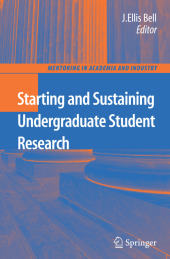 Neuerscheinungen 2020Stand: 2020-02-01 |
Schnellsuche
ISBN/Stichwort/Autor
|
Herderstraße 10
10625 Berlin
Tel.: 030 315 714 16
Fax 030 315 714 14
info@buchspektrum.de |

J. Ellis Bell
Starting and Sustaining Undergraduate Student Research
Ed. by J. Ellis Bell
1st ed. 2020. 2020. 229 mm
Verlag/Jahr: SPRINGER, BERLIN 2020
ISBN: 0-387-72889-9 (0387728899)
Neue ISBN: 978-0-387-72889-6 (9780387728896)
Preis und Lieferzeit: Bitte klicken
The purpose of this series is to provide resources related to teaching and career development for faculty at all stages of their careers and to scientists considering careers in industry. Young faculty [or graduate students and post docs thinking about going into academia] will find valuable information about how to design a course, how to find the right job, including academia and industry, and how to incorporate undergraduate research into their programs. Future volumes will be focused on a wide variety of topics including grant writing, how to incorporate service learning and outreach into the curriculum, mentoring and how to work towards increasing diversity in both the classroom and the college or university. For more established faculty interested in career development, or who are considering changes in career direction, such as transitions to industry, or who are simply interested in keeping up with new pedagogy, future volumes will include ones dedicated to "navigating the tenure and promotion process", being an effective department chair, developing courses for non science majors, assessing student learning and changing careers midstream. Written by acknowledged experts, each volume will provide practical guidelines geared towards faculty in a variety of institutions as well as discussion of problems and potential solutions facing both academics in the life sciencesand those working in industry.
Undergraduate research in the life sciences is recognized as playing a critical role in both the overall education of a student and in preparing a student to go on to graduate work in the life sciences. Furthermore, pedagogical research shows that early and sustained involvement in research activities benefits the student far more than either a senior year research experience or a single summer research experience. This monograph, "Starting and Sustaining Undergraduate Student Research"is aimed at faculty setting up an undergraduate research program and will deal with topics from recruiting first year students and designing suitable projects that can be sustained throughout their undergraduate experience to how to fully integrate their research activities with broader educational goals that will provide them with meaningful skills for their future.
1. Introduction and Overview a. What is Undergraduate Research (What is it Not!) b. Why is it a High Impact Teaching Practice? c. The Advantages of having an active research program d. The Problems encountered with Undergraduate Research 2. Structuring the Projects to get the most out of them: From Project to Publication a. The Faculty Perspective b. The Student Perspective c. Characteristics of a good research project 3. Structuring the Research: From Idea to Proposal to Presentation a. How to Promote Student Hypothesis Development b. The Importance of Presentation Skills 4. Structuring the Projects for Beginning Students- a. Incorporating Basic Concepts from Chemistry and Biology to the Research b. Progression from Novice to Expert 5. Recruiting & Mentoring Students a. When Should Students Start Research? b. Student Progression in a Project: see one, do one, teach one c. Mentoring Students beyond the lab 6. Setting a Research Group Mentality a. Goals and Expectations (for yourself and the students). b. Its more than just the research project c. Outreach and Access to Careers 7. Obtaining the Appropriate resources a. Space b. Time c. Resources 8. The Pluses and Minuses of Collaborative Efforts a. For You b. For your Students 9. Finding Funding a. Institutional b. Local c. Professional Societies d. Federal e. Tips for Writing the best proposals 10. Institutionalizing Student Research a. At the Departmental Level b. At the College Level 11. Course Based Undergraduate Research Experiences (CUREs) a. What is a CURE? b. The Roles for CUREs in Student/Faculty Research c. CUREs for Majors d. CUREs for Non-Majors e. CURE Consortia 12. The Importance of Assessing the Impact of Undergraduate Research a. Who is impacted? b. Types of Assessment c. Using the Assessment Data 13. Conclusions a. The Role of the Teacher-Scholar Model in Academia b. The Importance of Having a Plan c. Overcoming the Problems you will encounter


